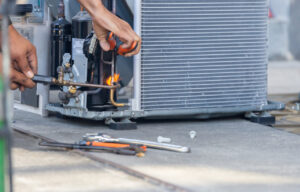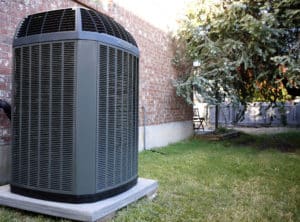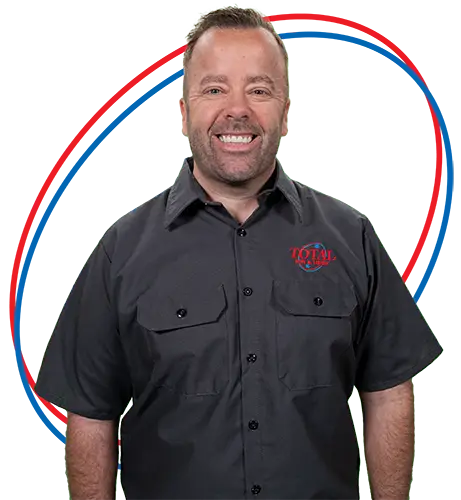At Total Air and Heat, we’ve seen all kinds of AC problems—from blown motors to frozen lines to the occasional squirrel nest in a condenser. But one issue pops up over and over again, season after season, dirty coils.
What happens if you don’t clean your AC coils? Let’s just say your comfort takes a hit, your system works harder than it should, and your wallet feels it first.
Most homeowners don’t realize how much those coils matter until something goes sideways. So let’s walk through what happens when you skip coil cleaning—and what you can do to stop the snowball effect before it turns into an avalanche.
Why Are Coils So Important?
Before we dive into the “what-if,” here’s the quick rundown on what coils actually do.
- Evaporator coil (inside): Pulls heat from the air inside your home.
- Condenser coil (outside): Releases that heat outdoors.
Both need to stay clean so the system can breathe, transfer heat, and cool your home efficiently. Picture them like the lungs of your AC. If they’re clogged, airflow gets choked, and the whole system struggles.
What Happens If You Don’t Clean Dirty Coils?
Dirty coils don’t just look bad—they throw off the entire balance of your cooling system. Here’s what you can expect if you let grime build up:
1. Weaker Cooling Performance
You crank the thermostat down, but the house still feels warm. That’s usually the first red flag. If the evaporator coil is coated with dust, it can’t absorb heat effectively. You’ll notice weak airflow and rising indoor temps—even though the system’s running.
2. Higher Energy Bills
When you have dirty coils, the system has to run longer to reach the same temperature. That extra runtime means extra electricity. We’ve had customers call in shocked at how fast their bills jumped—only to find a filthy coil behind the problem.
3. System Overheating or Freezing
Yes, it’s weird, but both can happen. Dirty evaporator coils may freeze over. On the flip side, dirty condenser coils can cause the compressor to overheat. Either way, you’re looking at poor performance and potential damage.
4. Compressor Failure
Here’s the big one. Your compressor is the most expensive part of the system. It takes the heat from indoors and moves it outside. When the coils are dirty, the compressor works overtime. Over time, it wears out—and replacement isn’t cheap.
5. Short Cycling
Your AC kicks on, then off, then on again—all within a few minutes. This “short cycling” can wear out parts fast. It’s often caused by airflow issues or heat transfer problems from dirty coils.
6. Musty or Burnt Smells
If dust sits on a coil long enough, it gets damp and becomes a breeding ground for mold. You’ll smell it in the vents. In worse cases, you’ll notice a scorched smell from overheating electrical components.
7. Water Leaks and Drain Problems
Dust and grime can clog the drain pan under the evaporator coil. Instead of draining properly, condensation backs up and spills into the cabinet or attic. We’ve seen ceilings stained and drywall soaked from something as simple as a plugged line.
Our Cleaning Process
We don’t believe in half-measures. At Total Air and Heat, our only way is all the way. If your coils need cleaning, here’s how we get it done:
Step 1: Inspect the System
We check airflow, refrigerant pressure, temperature drop, and visual signs of buildup. We’re not just guessing—we’re measuring.
Step 2: Disassemble Safely
We remove panels and guards to access the coils—carefully, so nothing gets bent or broken.
Step 3: Clean the Outdoor Condenser Coil
We remove debris with a brush, then use low-pressure water to flush out dirt. We apply a cleaner that cuts through grease and buildup without harming the metal.
Step 4: Clean the Indoor Evaporator Coil
These are trickier to reach, but our Eagle-Eyed Techs know their way around. We use a no-rinse foam cleaner that breaks down dirt and flushes the drain pan.
Step 5: Flush the Drain Line
This is key. If the coil’s dirty, odds are the drain line is too. We clear it out with compressed air or cleaning solution.
Step 6: Test and Reassemble
We put it all back together, fire up the system, and measure airflow and temperatures again to confirm the difference.
When to Call in the Pros
We’re all for DIY where it makes sense. But coil cleaning isn’t just another Saturday morning chore. Here’s when you should pick up the phone:
- You notice weak or warm airflow
- There’s ice on your indoor unit or lines
- Your outdoor unit sounds louder than usual
- Your home cools unevenly from room to room
- You smell mold or musty odors
- The system runs constantly but doesn’t cool well
- Your last service call was over a year ago
- You’ve done basic maintenance but still have issues
We’re your trusted next-door neighbor for 65 years. We show up on time, tell it like it is, and treat your system like it’s in our own home.
FAQs
How often should I clean my AC coils?
Once a year is a good rule of thumb. If you have pets, trees shedding leaves near the unit, or live near a dusty road, you might need it more often.
Can I clean them myself?
You can rinse your outdoor coil gently with a hose. But indoor coils are harder to reach and easier to damage. If in doubt, call us.
What happens if I ignore dirty coils long enough?
You’ll pay more each month, and your system could wear out years early. Compressor failure is common, and that’s one of the most expensive fixes in HVAC.
Is coil cleaning part of regular maintenance?
It should be. With our Tip Top Tuneup, we inspect and clean as needed—before small problems turn into big ones.
Why do coils get dirty so fast?
Poor filtration, leaky ductwork, high indoor dust, and outdoor landscaping debris can all speed up buildup. We can help figure out what’s causing it.
Don’t Let Dirt Win
Your AC doesn’t ask for much. A clean filter, a tune-up here and there, and clear coils to breathe through. But skip coil cleaning too long, and you’ll start feeling the effects—and so will your bank account.
At Total Air and Heat, we’re not comfortable until you are. We believe in helping folks get ahead of problems, not just patch them up after the damage is done.
Think your coils might need attention? Let’s take a look. You’ll feel the difference faster than you think. Give us a call today—and let your AC breathe easy again.

